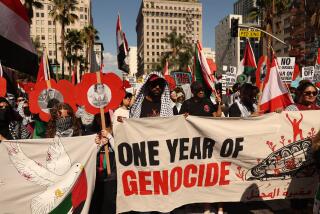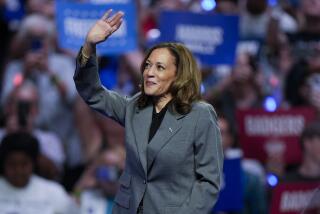Nationwide Protests of Gulf Policy to Be Held Saturday : Dissent: Grass-roots groups from New York to Los Angeles plan to call for a diplomatic settlement and an American troop pullout.
- Share via
WASHINGTON — Emboldened by public opinion polls showing some erosion of support for U.S. military intervention in the Persian Gulf, grass-roots peace groups are stepping up plans to stage on Saturday the first nationally coordinated anti-war demonstrations since Iraq’s invasion of Kuwait.
In about two dozen cities, community organizations that until now have been conducting quiet vigils and low-key teach-ins plan this weekend to call for a diplomatic settlement in the gulf stalemate and a pullout of U.S. troops.
Organizers said they expect thousands to attend a rally at noon Saturday at New York’s Columbus Circle and then march to Times Square. Other, smaller demonstrations are scheduled in Los Angeles, San Francisco, Seattle, Chicago, Boston and Atlanta, among other places.
In Washington, a “civil disobedience” is planned in front of the White House, where protesters have been staging vigils each Saturday afternoon since late August.
Organizers readily admitted this week that Saturday’s demonstrations are as much a coming-out party for peace activists as a well-executed nationwide show of anti-war sentiment.
“We just hope to awaken people in this country to the fact that there’s a growing voice of opposition to what President Bush is doing,” said Leslie Cagan, coordinator of the National Campaign for Peace in the Middle East.
“No one day of demonstrations can change our government’s policies, but they can call attention to the fact there is an opposition,” she said.
To be sure, President Bush’s handling of the gulf crisis still has broad support, registering close to 60% in the most recent public opinion polls. But that is down from 70% or higher in August and September.
The scheduled demonstrations also come at a time when mainstream church leaders, as well as former President Jimmy Carter, are openly expressing doubts about President Bush’s no-compromise policy.
Such voices of uncertainty and dissent may well grow--particularly if the stalemate becomes prolonged or if war erupts and many GIs are killed, analysts say.
Today, more than 50 peace groups across the country will begin buying time on local television stations to broadcast a 30-second message featuring Ron Kovic, the Los Angeles-based anti-war activist and much-decorated Vietnam War veteran, arguing against U.S. military intervention.
In addition, a handful of the more than 2,000 returned refugees from Kuwait and Iraq, feeling neglected, are considering going on national television to publicize their plight and that of their loved ones who remain hostages to the Iraqis.
The President saw manifestations of the emerging dissent Tuesday in Des Moines; Glen Ellyn, Ill., and Grand Rapids, Mich., as small clusters of hecklers interrupted his speeches on behalf of GOP candidates.
At the Des Moines Civic Center, Bush said his critics “shouldn’t be entirely written off, but they’ve got it wrong.” His voice rising, the President added: “You know, some people never get the word. The fight isn’t about oil. The fight is about naked aggression that will not stand.”
Another call this week for greater diplomatic attempts to resolve the stalemate came from Carter.
In a column in Time magazine and in an interview with the British news service Reuters, he said the Administration has not taken full advantage of Jordan’s King Hussein and members of the Arab League as diplomatic negotiators.
“So far, the Bush Administration has not acknowledged the need for negotiations or exploratory talks,” Carter wrote. He said the United States and its current allies in the gulf “can surely prevail” in the event of war, “but there will be serious human, economic and political costs.”
Late last week, seven mainstream Protestant and Catholic leaders, including the presiding bishop of Bush’s denomination, urged the President to rule out the use of military force. Some called on him to withdraw U.S. troops.
A coalition to coordinate Saturday’s demonstrations was formed recently in New York’s Riverside Church--a bastion of anti-war activity during the Vietnam War era--during a meeting attended by about 130 activists representing 85 peace groups from around the country.
Details for Saturday’s demonstrations still are not final, but organizers mentioned veteran activists such as Ramsey Clark and Daniel Ellsberg as likely speakers. Among others mentioned is Erik Larsen, a San Francisco Bay Area resident who is a lance corporal in the U.S. Marine Corps reserves. Larsen has declared himself a conscientious objector and has said that he will refuse to report for active duty if called.
More to Read
Sign up for Essential California
The most important California stories and recommendations in your inbox every morning.
You may occasionally receive promotional content from the Los Angeles Times.













